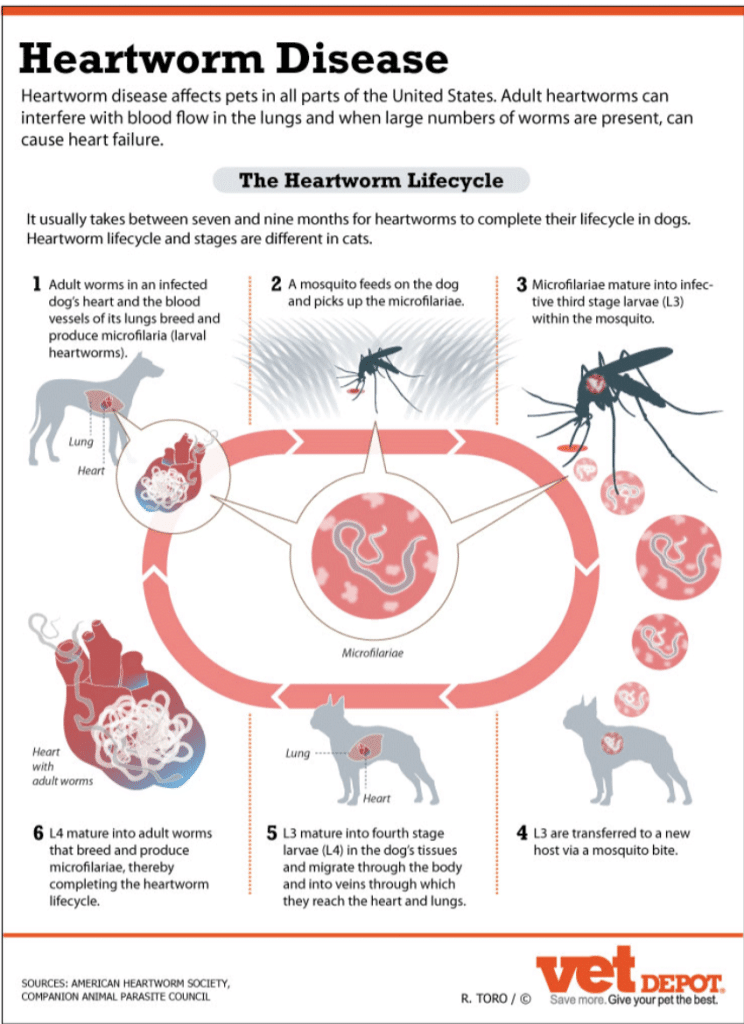What is heartworm disease?
As you sit in the exam room with your pup, your vet will likely ask you if your dog is on heartworm prevention and recommend a heartworm test. In some cases, heartworm testing may already be included in your dog’s annual wellness exam package. Why are veterinarians so persistent in recommending testing and prevention? Well, the old adage, “an ounce of prevention is worth a pound of cure,” rings particularly true with heartworm disease.
Heartworm disease is caused by Dirofilaria immitis, a parasitic worm that is transmitted by mosquitoes. When a mosquito bites a heartworm-infected animal, it ingests the blood containing microscopic larvae. The mosquito then transmits these microscopic larvae to its next canine victim, where they can live and grow to be up to 12 inches long! The “heartworm” gains its common name because of where it ends up in our beloved dogs — in their hearts, as well as in the blood vessels of their lungs. It can take years for a dog to become visibly sick; however, as the worms mature and reproduce in the blood vessels and heart, they cause irreversible damage. This damage can lead to severe heart disease that can be fatal. Successful treatments to kill heartworms do exist, but the medications are quite costly and the recovery period after the treatment has its own risks. The easiest way to keep our dogs safe is through prevention. Thankfully, nowadays our options are plentiful, cost-effective, and very safe, which means as your dog’s guardian you can have a meaningful conversation with your vet about which preventive is best suited for your dog. These include chewable tablets or topical medications that prevent infection when given monthly, as well as injectable options that can last up to one year.

Photo: Vet Depot
Are heartworms only in the south?
Historically, dog owners in the southeastern United States were advised to keep their dogs on prevention year-round, whereas those in other parts of the country (e.g., the northeast and southwest) were told they only needed to be on prevention during the summertime or rainy season because of the lack of mosquitoes in the colder or dryer months. This recommendation is changing. With climatic changes bringing warmer and wetter weather conditions farther north and warm snaps interrupting winter chills, mosquitoes now have the opportunity to be active year-round throughout the U.S. It only takes a day or two of roughly 50°F weather for a generation of mosquitoes to hatch and potentially spread heartworm disease.
Another confounding issue is how the incidence of heartworm disease has spread throughout the country. For decades, the disease was mainly diagnosed in dogs from states in the southeast and along the Mississippi River Delta. While this is still largely true, changes in animal rescue and shelter efforts have unintentionally introduced more heartworm-positive dogs into regions where the disease had previously been relatively uncommon. For instance, following Hurricane Katrina, animal rescues rightfully sprang into action to save shelter dogs impacted by the devastating effects of the hurricane by relocating them to states that were less affected. However, in moving thousands of these dogs across the country so they could find their forever homes, their parasitic burdens inadvertently came along for the ride. In addition to this event, the practice of transporting shelter dogs from southern states to northern states for adoption has increased in recent years, relocating their parasites with them. As local mosquitoes in these regions bite these newly-introduced infected dogs, the disease begins to spread in these previously lower-risk states.
Given these changes, it is imperative to test for and prevent against heartworm disease countrywide and year-round in our pets.
Heartworm tests
Heartworm disease testing involves two components: testing for the adult worms via a blood antigen test and testing for microfilariae (immature worm larvae) via microscopic examination of blood. Both tests should be performed at the same time, at least once a year, to ensure your dog is not infected by any life stage of the heartworm.
Can heartworm disease be prevented?
Oral, topical, or injectable preventives are dosed to prevent the larval stages from developing; however, they will not kill adult worms, which is why preventive measures need to be consistently applied to ensure the adult worms never have a chance to grow. The preventives are over 95-99% effective when used as prescribed, but it must always be noted that no medicine is ever 100% efficacious. One common reason for preventive failure is lapse in administration, as remembering to give a preventive on time, every single month, can be a challenge for many pet owners. If your dog does unfortunately become infected while taking veterinarian-prescribed prevention consistently, most pharmaceutical companies will stand by their products and will cover the cost of heartworm treatment if proper administration is proven, and annual testing is verified. Luckily, this is a very rare occurrence when preventives are used properly.
How is heartworm disease diagnosed and treated?
If a dog does become infected with heartworms, it can be tricky to recognize clinical signs early in the disease process, as dogs can remain asymptomatic for years while these worms grow and reproduce. Actually, most dogs that are diagnosed with heartworm disease show no clinical signs, and the fact they’re infected only comes to light during their annual wellness exams. This is in part why annual testing is recommended. It is also beneficial because treatment of the heartworms can be implemented earlier in the disease process before severe signs, such as heart failure, develop.
If the disease has progressed, clinical signs include exercise intolerance, lethargy, coughing, a distended abdomen, and even collapse. Treatment to kill the adult heartworms is lengthy and involves a variety of medications, including multiple injections of an arsenical compound that targets the worms. The heartworm treatment protocol also requires strict cage rest that can last up to six months or more. This is to prevent thrombi (blood clots) from being dislodged as a result of the adult worms dying off, which can be fatal to the dog.
While heartworm is undoubtedly a serious disease, it’s relatively easy to prevent it in our furry friends. All you really need is to visit your veterinarian regularly and pay close attention to administering preventives on time. To safeguard the heart of someone you love, that’s not too much to ask, now is it?
This article does not take the place of professional or medical advice. Always see your veterinarian to diagnose and treat health conditions in your dog. The author and Love, Dog do not accept any liability for any injury, loss, or damage caused by use of the information provided.
subscription
LOVE, DOG









